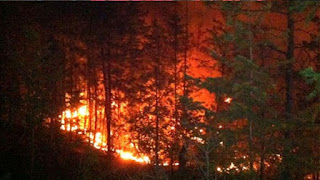 |
| life expectancy for a fin whale - approx. 94 years |
The young male appeared healthy but a
bit on the thin side, according to marine biology professor Jonathan Stern. The unusually warm weather that led to a huge algae bloom
extending from California to BC this summer resulted in a “major
reduction in food availability for whales,” says Michael Harris,
managing director of Puget Sound Express whale-watching. If, as a
result, this particular marine mammal was forced to swim further
afield in search of fish, it is well within reason to connect his
appearance with climate change.
 |
| it's not looking good for polar bears |
 |
| millions of hectares of BC forest habitat burned |
Most privileged people are conditioned
to feel far removed from the social unrest that has already come with
climate change in distant areas of the world. But the tragic drowning
of three year old Aylan Kurdi, his brother, mother and others fleeing
the crisis in Syria has recently brought Canadians face to face with
the life and death struggle of 'climate refugees.' While analysts
are quick to emphasize that climate change is not solely responsible
for the drought in Syria and that drought is only one of many
stressors that led to the humanitarian crisis and civil war, the need
for far more widespread recognition of the complex ways in which
drought, resource scarcity, and conflict in general intersect seems
urgent.
 |
| Syrian children in refugee camp - Northern Iraq |
It is also important to note that poor
agricultural practices, like over-grazing by livestock, have
contributed to desertification of the ecologically fragile Syrian
steppe for decades. According to biodiversity conservationist
Gianluca Serra, “a major role in the unfolding disaster was played
by affluent urban investors who threw thousands of livestock into the
steppe turning the grazing into a large-scale, totally unsustainable,
industrial practice.”
Even if Syria recovers politically, it
is estimated that it will have lost nearly 50% of its agricultural
capacity by 2050. The circumstances are far more complex than can be
adequately addressed here, but if global greenhouse gas emissions
continue at current rates, water shortages and droughts will only
worsen.
DIRECTIONS:
 |
| Syrian drought exacerbated by climate change |
While we will never be able to
precisely calculate the contribution of climate change to any one
geopolitical event or human crisis, we can and must take
responsibility for the myriad ways in which we collectively add to
it. The necessity of reducing animal product consumption,
particularly by those of us who have access to alternative sources of
nutrition, is an ongoing theme in this column for a very important
reason. Animal agribusiness produces more GHG emissions globally than
all transportation combined.
Anyone lucky enough to eat three times
a day has the ongoing opportunity to respond pro-actively to the
realities of global climate change, endangered species, and
vulnerable people around the world by making compassionate food
choices. For more on this topic, and thanks to the generous support
of actor Leonardo deCaprio, Netflix subscribers can tune in for the
important documentary “Cowspiracy: the Sustainability Secret”
starting on September 15th!
For additional references and links,
please see SEPT. 2015 RELATED LINKS, on the right hand side of this page.
MUHAMMARA– Syrian Roasted Red Pepper and
Walnut Dip (thanks to Jeanette!)
INGREDIENTS:
2 cloves garlic, mashed
Juice of one organic lemon
4 red bell peppers, roasted
1/4 cup extra virgin olive oil
1/2 cup toasted walnuts
1/3 cup toasted pine nuts
2 T. Pomegranate molasses
1 C of organic whole grain or
gluten-free bread crumbs)
DIRECTIONS:
Place all ingredients in a food
processor and blend until mostly smooth, like pesto.
Depending on the heat of your chili
peppers, you may wish to use more, or less.
Serve with fresh pita bread, or as a
sauce on baked tofu kabobs... Bon appetit!

No comments:
Post a Comment